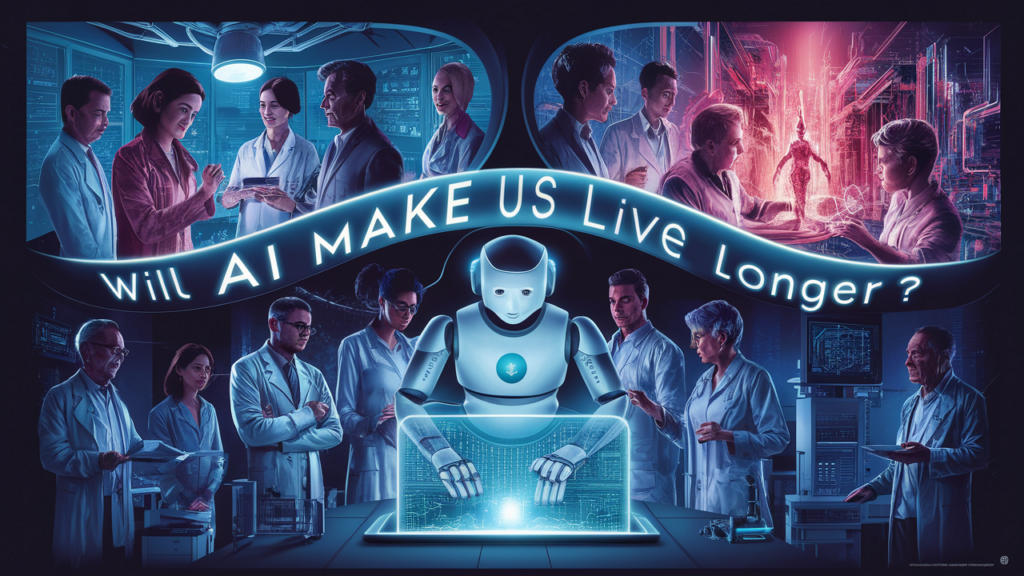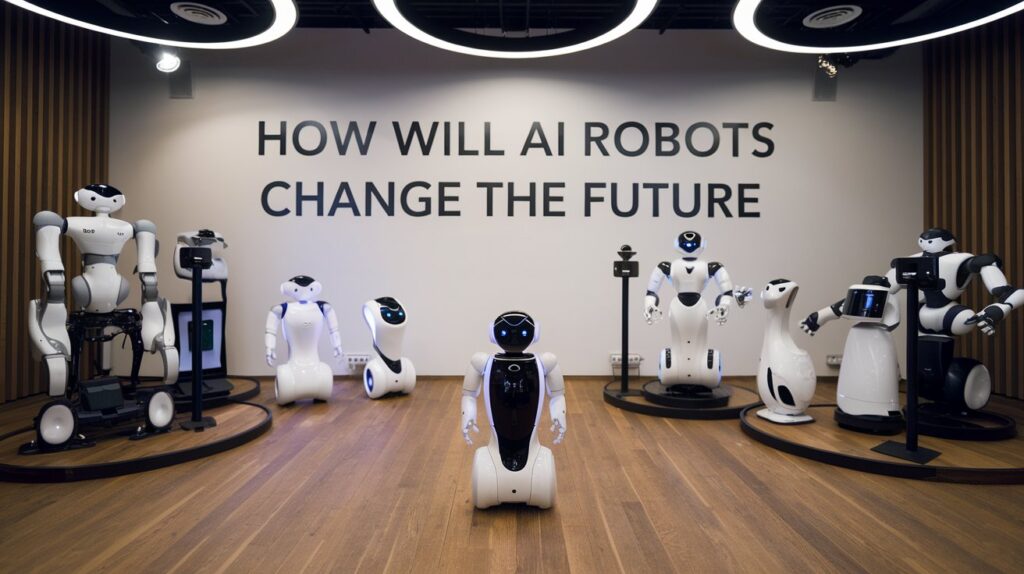Will AI Make Us Live Longer?

Artificial Intelligence’s potential to extend human lifespan is a topic of growing interest and debate. As AI technologies advance, their applications in healthcare, drug discovery, and personalized medicine offer promising avenues for prolonging life and improving its quality. From accelerating the development of life-saving treatments to enhancing early disease detection, AI’s impact on longevity seems increasingly significant. However, this potential comes with complex ethical considerations and challenges. As we contemplate the intersection of AI and human life expectancy, we must carefully weigh the benefits against the risks and societal implications.

Key Takeaways
- AI accelerates drug discovery and personalized treatment plans, potentially extending human lifespan.
- AI-powered early disease detection and intervention can prevent or delay age-related health issues.
- AI analyzes genomic data and unravels aging mechanisms, leading to targeted longevity interventions.
- AI enhances daily living for older adults, improving safety and quality of life.
- AI-driven data management in healthcare enables more effective, personalized strategies for longevity.
Will AI Make Us Live Longer audio file
AI in Drug Discovery
As we explore the potential impact of artificial intelligence on human longevity, it is crucial to examine its role in drug discovery, where AI-driven approaches are revolutionizing the identification and development of treatments for age-related diseases. AI’s ability to analyze vast amounts of data has accelerated the process of identifying new drug targets and potential treatments.
By leveraging sophisticated algorithms, researchers can now more efficiently discover compounds that may delay or prevent age-related conditions. AI’s capacity to process complex genomic and biomarker data enables the development of personalized treatment plans, tailoring interventions to individual patients. This approach holds promise for detecting early signs of age-related diseases and intervening before they progress.
Furthermore, AI is proving invaluable in unraveling the intricate mechanisms of aging itself. By identifying patterns and correlations in biological data, AI helps researchers gain deeper insights into the aging process, potentially leading to more effective interventions.
While the use of AI to identify and develop treatments for age-related diseases shows great promise, it is important to approach these advancements with cautious optimism. As research progresses, the true potential of AI in extending human longevity will become clearer.
Personalized Medicine Advancements

Building upon AI’s contributions to drug discovery, personalized medicine advancements powered by artificial intelligence offer promising prospects for extending human longevity through tailored interventions and treatments. AI’s ability to analyze vast amounts of genomic and biomarker data enables the development of highly individualized treatment plans for patients, potentially revolutionizing the approach to age-related diseases.
By targeting underlying aging mechanisms, AI-driven personalized medicine aims to provide more effective treatments for age-related conditions. This approach enhances doctors’ ability to address individual patient needs, potentially improving outcomes and quality of life. The accelerated research pace facilitated by AI contributes to the discovery of innovative treatments that may delay or prevent age-related diseases.
| Personalized Medicine Aspect | AI Contribution | Potential Impact |
|---|---|---|
| Genomic Analysis | Data Processing | Tailored Treatments |
| Aging Mechanism Research | Pattern Recognition | Disease Prevention |
| Treatment Optimization | Predictive Modeling | Improved Outcomes |
While the potential of AI in personalized medicine is significant, it is essential to approach these advancements cautiously. The complex nature of aging and individual variability necessitates thorough validation of AI-driven interventions. Nonetheless, the integration of AI in personalized medicine represents a promising avenue for understanding aging mechanisms and developing innovative treatment approaches that may contribute to increased longevity.
Early Disease Detection
The integration of artificial intelligence in medical diagnostics heralds a new era of early disease detection, potentially revolutionizing preventive healthcare and contributing to increased longevity. AI’s ability to analyze complex medical images, such as CT scans and MRIs, with unprecedented accuracy and speed enhances the identification of disease markers that may elude the human eye. This technological advancement complements the expertise of healthcare professionals, leading to more precise and timely diagnoses.

The impact of AI on early disease detection is multifaceted:
- Improved accuracy in identifying subtle abnormalities
- Faster processing of large volumes of medical data
- Enhanced predictive analysis for proactive health interventions
Loneliness Mitigation Through AI

With the rise of AI technologies, innovative solutions are emerging to address the pervasive issue of loneliness, particularly among older populations. Loneliness mitigation through AI has become a promising field of research, with universities collaborating to develop intelligent systems that enhance social interactions and provide companionship.
Natural language processing techniques are being employed to create smart pets, responsive objects, and robot companions that can engage in meaningful conversations and offer emotional support. These AI-driven solutions have shown potential in improving well-being and reducing feelings of isolation among the elderly.
Intelligent assistive devices are designed to complement human interactions, rather than replace them, by providing continuous companionship and support.
While the efficacy of AI in combating loneliness is still being studied, early results are encouraging. The integration of AI-powered companions into daily life may contribute to an overall improvement in quality of life for those facing social isolation.
However, it is essential to approach this technology with caution, considering potential ethical implications and ensuring that AI solutions do not inadvertently exacerbate feelings of loneliness by reducing human-to-human contact. Further research and careful implementation will be crucial in realizing the full potential of AI in loneliness mitigation.
Ethical Challenges in AI Healthcare
As artificial intelligence continues to revolutionize healthcare, a myriad of ethical challenges emerge, demanding careful consideration and proactive measures to ensure responsible implementation. The integration of AI in healthcare systems raises significant concerns regarding patient data privacy, consent, and algorithm bias. Balancing the potential benefits of AI-driven healthcare solutions with ethical principles is crucial for maintaining public trust and ensuring equitable access to these technologies.
Key ethical challenges in AI healthcare include:
- Protecting patient data confidentiality and obtaining informed consent
- Addressing algorithm bias and ensuring fair treatment across diverse populations
- Maintaining transparency in AI decision-making processes
Healthcare providers and policymakers must carefully navigate these ethical challenges to harness the full potential of AI while safeguarding patient rights and wellbeing.
Striking a balance between innovation and ethical considerations is essential for the responsible deployment of AI in healthcare settings. This requires ongoing dialogue between stakeholders, including healthcare professionals, ethicists, and policymakers, to develop robust frameworks that address these concerns.
AI-Enhanced Daily Living

Numerous advancements in artificial intelligence are transforming daily living, offering innovative solutions for health monitoring, personalized assistance, and enhanced quality of life for individuals across various demographics. AI technology is being integrated into everyday objects, such as smart cutlery, to detect potential health issues and provide valuable insights into an individual’s wellbeing. These small changes can have a significant impact on Human Longevity by enabling early intervention and personalized care.
| AI Application | Benefit | Impact on Longevity |
|---|---|---|
| Fall monitoring | Rapid response | Reduced injury risk |
| Health issue detection | Early intervention | Improved outcomes |
| Personalized assistance | Enhanced independence | Better quality of life |
| Smart home integration | Safer environment | Reduced accidents |
AI development focuses on creating acceptable and user-friendly technology to assist with daily tasks, particularly for individuals with neurodegenerative diseases. By providing intelligent solutions for health and wellbeing monitoring, AI has the potential to positively impact daily life and contribute to increased longevity. However, it is essential to approach these advancements cautiously, considering ethical implications and ensuring that AI-enhanced daily living solutions are developed and implemented responsibly to maximize their benefits while minimizing potential risks.
Data Management for Longevity
Effective data management plays a pivotal role in advancing longevity research and personalized healthcare strategies. The integration of Artificial Intelligence (AI) with comprehensive health data collection methods has revolutionized our approach to understanding and potentially extending human lifespan.
Wearable devices, electronic health records, and imaging scans contribute to a vast repository of patient information, which AI algorithms can process to identify patterns and potential targets for age-related diseases.
The synergy between data management and AI in healthcare offers several key benefits:
- Early disease detection through analysis of large-scale health data
- Personalized treatment plans based on individual health profiles
- Identification of novel aging mechanisms and intervention strategies
However, the effective implementation of data management for longevity research faces challenges. Ensuring data privacy, standardizing data collection methods across diverse sources, and developing robust AI models capable of handling complex health data are critical considerations.
As we continue to explore the potential of AI in extending human lifespan, it is essential to maintain a balanced approach, recognizing both the promising advancements and the ethical implications of large-scale health data management.

Frequently Asked Questions
Can AI Help You Live Longer?
AI longevity research shows potential for extending human lifespan through advanced drug discovery and personalized medicine. While promising health benefits exist, it’s important to approach these developments cautiously and analytically, considering both opportunities and limitations in AI-driven longevity advancements.
Will AI Reverse Aging?
AI and longevity research shows promise in understanding aging mechanisms, but reversing aging with AI remains speculative. While AI may contribute to developing interventions that slow aging processes, complete reversal is currently beyond scientific capabilities.
Will AI Make Our Lives Better?
AI potentially offers improved healthcare and enhanced productivity, potentially leading to increased longevity and better quality of life. However, careful consideration of ethical implications and potential drawbacks is necessary to ensure responsible implementation and equitable benefits for society.
How Likely Is AI to End the World?
The likelihood of AI ending the world remains uncertain. Experts debate potential AI risks, ranging from negligible to existential. Ethical concerns and ongoing research focus on mitigating risks while balancing technological progress. Cautious development and regulation are crucial.
Conclusion
The potential of AI to extend human longevity is significant, yet complex. While AI-driven advancements in drug discovery, personalized medicine, and early disease detection offer promising avenues for prolonging life, ethical challenges persist.
Balancing the benefits of AI-enhanced healthcare with concerns about data privacy and algorithmic bias is crucial. As AI continues to evolve, its impact on longevity will likely depend on careful implementation, ongoing research, and addressing societal implications to ensure equitable access and responsible use.







Yes i belive so, new technologies can scan you’re body so ai based tools can find the right treatment. As long as big pharma don’t fuck this up..